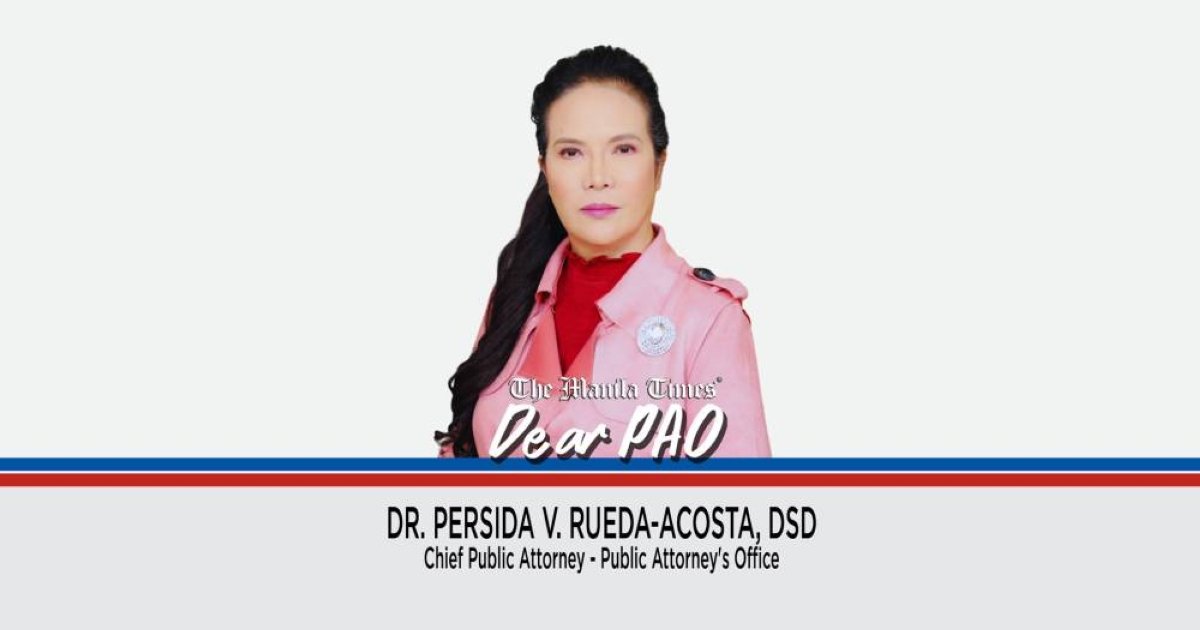Dear PAO,
My cousin filed a criminal case, which was heard in court but was eventually dismissed. My cousin said that the assailant only presented one witness, while he had several witnesses who testified for him, and he submitted a good number of evidence. So, we really could not understand why or how the case was dismissed. According to a paralegal officer my cousin spoke with, the evidence that my cousin submitted was not enough to prove the guilt of his assailant as there were inconsistencies in the evidence and testimonies of his witnesses. Can this really happen?
Antonia
Dear Antonia,

Proving the criminal liability of an accused does not merely rest on the number of pieces of evidence presented against him or her, but rather on the substance and significance of those evidence. Accordingly, the evidence to be submitted against an accused must concretely and convincingly point to his or her commission of the crime, excluding the possibility of another person committing it, regardless of how many or few such pieces of evidence may be.
It also bears stressing that our laws do not require evidence to prove absolute certainty of the guilt of the accused. Rather, evidence tending to prove the moral certainty of the accused’s guilt would suffice. As expressly provided for under Section 2, Rule 133, Revised Rules on Evidence (AM 19-08-15-SC):
“Section 2. Proof beyond reasonable doubt. – In a criminal case, the accused is entitled to an acquittal, unless his or her guilt is shown beyond reasonable doubt. Proof beyond reasonable doubt does not mean such a degree of proof as, excluding possibility of error, produces absolute certainty. Moral certainty only is required, or that degree of proof which produces conviction in an unprejudiced mind.”
Corollary, the criminal case initiated by your cousin may have indeed been dismissed because of the inconsistencies in the evidence and testimonies of the witnesses for the prosecution, thereby failing to establish with moral certainty the guilt of the accused.
Moreover, we wish to emphasize that it is not the responsibility of the accused to prove that he or she is innocent of the crime being charged against him or her. While it is in his or her best interest to submit ample evidence to support his or her defense, his or her guilt will not depend thereon. Rather, as consistently held by our courts, it is the prosecution’s responsibility to prove the guilt of the accused. So, whether the accused only submitted a single piece of evidence and the prosecution submitted an ample amount of evidence, if there are circumstances which still cast doubt on the mind of the court as to the guilt of the accused, the court will dismiss the criminal case and render a judgment of acquittal. For better understanding, we wish to impart a pertinent portion of the ruling of the Supreme Court in the case of Capistrano Daayata, Dexter Salisi, and Bregido Malacat, Jr. vs. People of the Philippines (March 8, 2017, GR 205745), as penned by Associate Justice Marvic M.V.F. Leonen:
“While not impelling such a degree of proof as to establish absolutely impervious certainty, the quantum of proof required in criminal cases nevertheless charges the prosecution with the immense responsibility of establishing moral certainty, a certainty that ultimately appeals to a person’s very conscience. While indeed imbued with a sense of altruism, this imperative is borne, not by a mere abstraction, but by constitutional necessity:
“This rule places upon the prosecution the task of establishing the guilt of an accused, relying on the strength of its own evidence, and not banking on the weakness of the defense of an accused. Requiring proof beyond reasonable doubt finds basis not only in the due process clause of the Constitution, but similarly, in the right of an accused to be ‘presumed innocent until the contrary is proved.’ ‘Undoubtedly, it is the constitutional presumption of innocence that lays such burden upon the prosecution.’ Should the prosecution fail to discharge its burden, it follows, as a matter of course, that an accused must be acquitted. As explained in Basilio v. People of the Philippines:
“We ruled in People v. Ganguso:
“An accused has in his favor the presumption of innocence which the Bill of Rights guarantees. Unless his guilt is shown beyond reasonable doubt, he must be acquitted. This reasonable doubt standard is demanded by the due process clause of the Constitution which protects the accused from conviction except upon proof beyond reasonable doubt of every fact necessary to constitute the crime with which he is charged. The burden of proof is on the prosecution, and unless it discharges that burden the accused need not even offer evidence in his behalf, and he would be entitled to an acquittal. Proof beyond reasonable doubt does not, of course, mean such degree of proof as, excluding the possibility of error, produce absolute certainty. Moral certainty only is required, or that degree of proof which produces conviction in an unprejudiced mind. The conscience must be satisfied that the accused is responsible for the offense charged.
“Well-entrenched in jurisprudence is the rule that the conviction of the accused must rest, not on the weakness of the defense, but on the strength of the prosecution. The burden is on the prosecution to prove guilt beyond reasonable doubt, not on the accused to prove his innocence.”
We hope that we were able to answer your queries. Please be reminded that this advice is based solely on the facts you have narrated and our appreciation of the same. Our opinion may vary when other facts are changed or elaborated on.
Editor’s note: Dear PAO is a daily column of the Public Attorney’s Office. Question for Chief Acosta may be sent to [email protected]










